#artistocrat
Explore tagged Tumblr posts
Text
having two chicken tenders for dinner lucky me
16 notes
·
View notes
Note
Okay Lolly, where is the Hunlow Bridgerton AU? /j lol

#AGSVSJDNDK sorry this was my first thought#because bridgerton is very....WOW. its a lot#i know what you meant#i did think about this for a solid few minutes after you sent the ask#i think willow would be like a marina and penelope hybrid#a humble farm girl whos sent to live with the Blights#Odalia and Gilbert used to be friends back when Gilbert was still rich#he left the artistocratic life and went to live out in the countryside with his dear friend Harvey who is helping him raise his daughter#Gil is cashing in a favour from Odalia#Hunter is....idk some annoying guy with a high ranking status who trots around on his horse and pisses everybody off#thats all i got
20 notes
·
View notes
Text
OK I'm rambling about Screwllum, this is a very nonsensical post because though I like ramble and analysis stuff, I never talk about them publicly because it ends up being a jumbled mess. My brain just functions that way but please bare with me. [I think I should note that there is spoilerish content for those who likes to check the notes, events or curios in this game ]
I read a few of the Gold and Gears content or hidden Screwllum lore through curios, notes or the occurrence events and it just hits me that Screwllum just exists for the entire 1.6 quests and the new SU dlc dosent really involved him at all. He dosent do much but he is relevant.
But I can't stop thinking that this guy is the guy that got the IPC to cancel their plans about eliminating mechanical lifeforms across the universe, this is the guy in one of the resistance groups against Emperor Rubert. But what makes his rebellion different during the Emperor Rubert wars? HES A MACHINE JUST LIKE HIM. HE ALSO SAVED ORGANIC LIVES. like that fact alone wouldn't be so interesting to me if he wasn't a machine.
And somehow it feels like his character hadn't that much focus during the dlc. Buuut I haven't finished the dlc yet so maybe there's a few occurrences or some of the story endings i didn't encounter yet
Soo maybe there's things there that I didn't know yet about him unless I got informed.
ITS JUST it's weird that he's treated with a sidelined light in favor for Ruan Mei [since yknow, big character for 1.6] but he has importance during Emperor Rubert's time.
But i do guess it's on his decision that they made in the dlc and dosent wanna show this fact all over your face.
There is like hints or a few notable content about planet screwllum during the dlc that's good. Like ooo Mechanical City, finally get to know a bit about the capital of Planet Screwllum Like the intra-cognitive events are all set there. And also how Planet Screwllum's people can function like humans [THEY CAN CRY AND TEAR UP DO YOU KNOW THAT?? SCREWLLUMITES CAN CRY THEY CAN ALSO PASS AWAY APPARENTLY <atleast they have population control>] [but somehow Screwllum worries about what he drinks and it should be machine oil for some reason]
So hey! We are learning more about his people this update, slowly and surely! [how All of these hints is giving me false hope- there's no planet screwllum update in the future they definetlt won't they are not brave enough to make several patches with very robotic humanoids they wo]
I got brain burned
tldr: Screwllum should be a more important character in the 1.6 patch especially in the new SU dlc because he has relevance in the time period its based on
#what if he purposefully didnt put much info about that in the dlc because of how it would make him a bit narcicistic as Herta and Ruan Mei#little headcanon of mine#but he does like paste his name everywhere in his planet from like planet name and to his people#planet screwllum and the word Screwllumites sounds better if hes dead lmao#kididng ily screwllum#yea thats it thank you for reading#mechanical artistocrat screwllum I#honkai star rail#hsr#screwllum
46 notes
·
View notes
Text

she looks so ggood in this
#never tried the finery outfit but i like it#the high boots and tight pants#the details#and i love the puffy sleeves#an outfit for a noble on the move#when youre an artistocrat but you gotta who loves your flounce but you gotta kill people#aest: maior hawke#grapecase plays da2#maior hawke pt
2 notes
·
View notes
Text
as much as i adore gale and astarion , i feel like out of every one in camp , if astarion were immediately attracted to someone— it would be wyll.
#headcanons.#wyll just falls into the characteristics of what i think astarion would be the most attracted to#artistocrat with a magnetic personality#dashing#brave#gallant#kind#very handsome prince trope coded lmao#prince charming if you will#just makes sense in my head
2 notes
·
View notes
Text
Best part is there was a documentary about the preparations for the ceremony that aired a few days ago, and the president of the IOC was being explained the concept, and Thomas Jolly is like "So this tableau is called 'Revolution'" and the guy says, "But no guillotine, right??"
And there weren't any guillotines! Technically!!
Gojira at the opening ceremony! 🤘🏼🔥
#paris 2024#video#thomas jolly#in french please#also that severed head at the start is singing a revolutionary song#that includes the actual lyrics#“we will hang the artistocrats”#with several European royals in the audience
2K notes
·
View notes
Text
'Great Scott! Can the actor known as Fleabag's Hot Priest shift to playing several melancholy mopers? Count on the irresistible Andrew Scott to fire up Vanya, a one-man take on Anton Chekhov's Uncle Vanya beginning in March 2025 off Broadway.
A hit in 2023 in London, the show marks Scott’s return to the New York stage after nearly two decades. He made his 2006 debut on Broadway opposite Julianne Moore and Bill Nighy in The Vertical Hour.
Since then, Scott’s screen roles in Fleabag, Sherlock, All of Us Strangers, and Ripley have amped up the Irish actor’s star status. All the while, Scott has worked steadily on stage in London, where he started out in the early 1990s and has since won two Olivier Awards.
Get to know more about Scott’s standout stage roles, then be sure to see him play the title role (and all the other characters) in Vanya at the Lucille Lortel Theatre.
Get Vanya tickets now.
Brighton Beach Memoirs
Scott’s stage roots are, in a way, based in New York – specifically Brooklyn, where Neil Simon’s 1983 dramedy is set. In a 1992 production in Dublin, Scott played Stanley Jerome, a supportive older brother who provides a bit of humor amid family struggles.
Six Characters in Search of an Author
In a 1996 staging of Luigi Pirandello’s absurdist drama, Scott was back in family mode in the role of an aloof son. The show was presented at the Abbey Theatre, where Scott appeared the same year in The Marriage of Figaro and A Woman of No Importance.
Long Day’s Journey Into Night
In Eugene O’Neill’s autobiographical drama about a family’s harrowing struggle with illness, addiction, and emotional turmoil, Scott played the sickly, introspective son, Edmund. For his performance in this 1998 staging at the Gate Theatre in Dublin, Scott was named actor of the year at the Sunday Independent Spirit of Line Arts Awards.
Dublin Carol
Scott made his London stage debut in 2000 at the Royal Court Theatre in Conor McPherson’s moody yuletide drama. Scott played Mark, a young man searching for his place in life, alongside Brian Cox as a forlorn funeral director.
The Irish Times praised Scott for bringing the “hopefully innocent Mark” to life. Scott returned to the Royal Court in 2006 for McPherson’s grief-themed Dying City and in 2009 for Mike Bartlett’s emotionally charged Cock.
A Girl in a Car with a Man
Rob Evans’s unsettling play revolves around the abduction of a girl captured on closed-circuit TV video. For his role as gay narcissist Alex in a 2004 staging at the Royal Court, Scott won an Olivier Award for Outstanding Achievement in an Affiliate Theatre.
The Vertical Hour
In 2006, Scott made his Broadway debut in director Sam Mendes’s staging of David Hare’s drama about a former war correspondent (Julianne Moore) confronting her past and the men in her life – fiancé Phillip (Scott) and his father, Oliver (Bill Nighy). The New York Times critic praised Scott’s “touching vulnerability.”
Fleabag
Phoebe Waller-Bridge’s Emmy Award-winning series began as a 2013 one-woman play. Scott's character of a foxy pastor, and the title character's unholy obsession, first appeared in the TV adaptation.
Still, we'd be remiss not to include Fleabag here. There’s a fan-favorite moment in the second season when Fleabag speaks to the audience by looking directly into the camera. The priest sees her do it, asking, “Where’d you just go?” It's a theatrical moment — breaking the fourth wall at its deepest and finest.
Hamlet
To be or not to be… the lead role in this Shakespeare classic? In 2017, Scott stepped up as the dour Hamlet in a production directed by Robert Icke that began at the Almeida Theatre and transferred to London's West End. London Theatre praised Scott, who was nominated for an Olivier Award, for his “boyishly youthful demeanor” in the demanding part.
Present Laughter
Noël Coward becomes him. Scott played the charismatic, if self-absorbed, actor Garry Essendine in this 2019 revival at the Old Vic. London Theatre's critic wrote: “A magnetic Scott delivers again.” The star turn won Scott an Olivier Award. In his acceptance speech, Scott said Coward “put forth so many brave and progressive ideas through comedy.”
Nine years earlier at the same theatre, Scott starred in Coward’s Design for Living, a comedy about a complicated three-way relationship.
Vanya
This acclaimed solo adaptation of Uncle Vanya by Simon Stephens (The Curious Incident of the Dog in the Night-Time) arrives off Broadway following its acclaimed 2023 London run. The show, filmed live in the West End, features Scott playing multiple roles, each of them bedeviled by regret. In a five-star review, London Theatre called Scott's performance "a truly remarkable theatrical feat" — so be sure to experience it for yourself.
Get Vanya tickets now.'
#Andrew Scott#Vanya#Hamlet#Present Laughter#Olivier Awards#Off-Broadway#West End#The Vertical Hour#Broadway#A Girl in a Car with a Man#Dublin Carol#Fleabag#Hot Priest#Phoebe Waller-Bridge#Anton Chekhov#Uncle Vanya#Brighton Beach Memoirs#Sherlock#All of Us Strangers#Ripley#Six Characters in Search of an Author#Abbey Theatre#Long Day's Journey Into Night#Royal Court Theatre#Dying City#C*ck#Almeida Theatre#Garry Essendine#Design For Living#Where are Three Kings - Artistocrats - Emperor and Galilean - Sea Wall - Birdland - Roaring Trade and The Dazzle in this list??
1 note
·
View note
Text
In Catalan culture, some holidays are personified in a character. In Gràcia (a neighbourhood of Barcelona), Christmas starts with the arrival of Esperit de Nadal (Christmas Spirit) with his companions senyor Caneló d'Escudella i Bontorró ("Sir Escudella Cannelloni and Good-nougat", a parody of an artistocratic name referencing the traditional Catalan Christmas foods). Esperit de Nadal is a capgròs (big head figure, read more about them in this previous post).
They arrive at Gràcia and dance on the streets greeting the children, and at the end of the parade they do a dance that ends with removing Esperit de Nadal's hat, revealing a tiny Nativity scene on its head.
Video by Cultura Popular Barcelona.
#el senyor escudella etc etc té un aire al pere aragonès. just saying.#gràcia#barcelona#catalunya#capgrossos#nadal#christmas#folk culture#christmas spirit#tradicions#europe#folklore#christmas traditions
112 notes
·
View notes
Text
Quick worldbuilding hack, if you want to make a coherent political system for your fantasy world:
Basically, between the fall of Rome and early modern times, in Europe* most political organization wasn't actually kingdoms ruled by One True King like it's usual in fantasy, but something like this:
Feudalism: here, the center of power was not the nation (there was little concept of such thing) or the state, and not even the King, but the landowners (from kings to dukes to counts...) and their network of vassalages to each other. There were no "countries" but rather hereditary titles, and the people who held them. There was little of a true state besides what individual rulers did; they didn't even have formal armies as such, but rather the vassals who provided them, they and could have multiple allegiances. Examples are of course the Holy Roman Empire (neither holy, etc. etc.) France (note that the 100 Years War was a dispute about titles rather than France vs. England), Spain (actually a bunch of kingdoms and crowns rather than a country), etc...
"Empires": A state where a central goverment exerts power over other territories and peoples. These are rather familiar to us, because a formal state exists here, and the ruler is more powerful and often does have a standing arming and administration instead of relying on vassals. Here, there is a bureacracy and a claim to rule a territory, and while they might have vassals and prominent artistocratic families (everyone did) their administration was state-based, not allegiance based. The Roman Empire is the most imperial empire, as well as its cringefail successor the Byzantine Empire, but note that the great Islamic empires also had this kind of administration, with governors appointed and confirmed by the imperial court.
City-States: Basically a powerful city (though they were often the size of small towns, still, very rich) ruled by a local aristocracy, sometimes hereditary, sometimes elected from a few families or guilds, or a mix of both, and in some cases ruled by religious authorities. These could be independent or organized in alliances, but were often vassals of more powerful goverments such as above. Cities are in many way the building brick of larger states; of note, in the Ancient Mediterranean before Rome conquered it all, leagues of city-states were the main powers. Medieval and Early Modern independent city states were the Italian city states of course, and a famous league was the Hansa (many of its members themselves vassals of other powers)
Tribes and Clans: Every culture is different with this, but basically here the centre of power is the relationships between families and kinship. If this sounds familiar to Feudalism, you've been paying attention; Feudalism is what happened when the Roman empire and administration fell, and it was replaced by landowners and their ties of vassalage and allegiances.
Now, besides the history lesson, why is this important? Because there are reasons why rulers had their power, and you should know that.
A king never ruled alone. He was only the head of nobles tied by vassallage (feudalism), or the head of a inherited state bureaucracy and army ("empire"). If you killed the king, another one would rise from the prominent families. Often by bloody civil wars or conquest yes, but the system overall would stay. A king did not reign by its own power or virtue, but because the system itself supported him, and of course, he maintained the system.
A new king who wants to replace the bad old king (a common fantasy storyline) needs to also deal with the allegiances of all its vassals (who would probably rather kill him and take the throne themselves) or build a bureaucracy and an army, supremely expensive endeavors in those times, which took decades if not centuries to build. In fact, the Byzantines and the Arabs inherited most of their state aparatus, in one way or the other, from the Romans.
This is also why these systems lasted so long, too. The appearance of modern republics and other systems of goverment needed the coordination of people and revolutions that did not just kill the king, but also replace it with something else, and for that you need literacy, economic changes, an empowered populace... But that's for another time.
I hope this is fucking helpful because I don't want to spell allegiance ever again.
*I would love to do more about goverments outside Europe, especially Precolombine American ones like the redistrubitionist state-based economy of the Incas, or the Mesoamerican city-states. But that's for another time.
1K notes
·
View notes
Photo


Mosaic from the 4th century BC discovered in Erétria, Euboea island, Greece. The mosaic depicts two satyrs, the older one dancing at the melody played by the younger one. The mosaic was found in a location where more ruins of late classical artistocratic houses have been unearthed as Ancient Erétria was prospering at the time. Based on the dimensions and the shape of the room with this flooring, it was likely an “andronas”, the room of the house which was exclusive to men, where the symposia took place. The classical mansion was abandoned in later times and was turned to a Christian cemetery by the 5th - 6th century AD.
Source
#greece#ancient greece#mosaic#art#greek art#ancient greek art#satyr#greek mythology#classical greek art#eretria#euboea#evia#sterea hellas#central greece#greek islands#greek culture#greek history
72 notes
·
View notes
Text
AU designs for a weird au


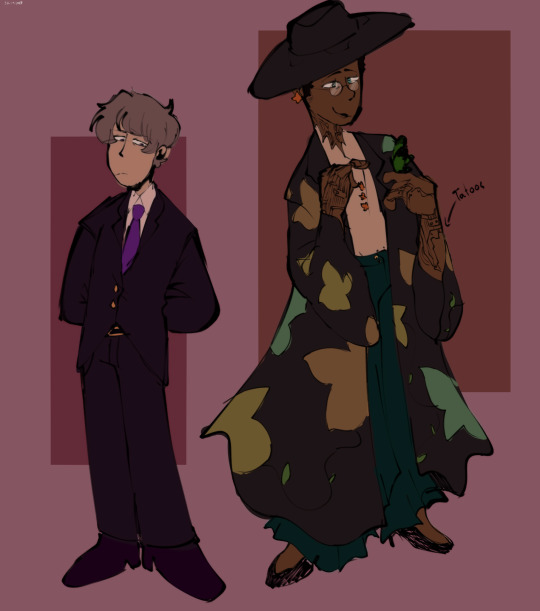
#yea jts a fiona and cake inspired au where everybody are just living normal ljves and are the opposite gender#honkai star rail#honkai star rail herta#mechanical artistocrat screwllum I#caelus#honkai star rail caelus#March 7th#Dan Heng#Honkai star rail himeko#HSR#Welt Yang
20 notes
·
View notes
Text
(if it didn't put an awkward wrench into Heartbeat Program, I would've added the Heartland Nobility stuff in from the back of my head, but then that means Shun Might Know instead of He's Clueless But Suspicious. I'd rather he found out like everyone else might; purely on accident)
heehoo Heartbeat time
#marwospeaking#Nobility as in If You Contribute Highly To Life Quality Improvement You Are Nobility. rather than like. an actual aristocratic thingy#It makes the Arclight's artistocratic aesthetic make even more sense than purely Tron's fashion sense being really good#granted in Arc V terms he would not be Tron anyway. because neither Number nor Barian nor Astral Being exist for that to happen#this does delete Shark. Rio. Dumon. Mizael. Alito. Girag. and Vector from Xyz. alongside Don. Astral. and Eliphas.#and. I could be so incredibly wrong. doesn't Astral not being there mean that Yuma also can't be there. or are they not directly connected?#(Okok yes Shark and Rio aren't actually deleted. They exist as kids before the car crash that replaced them with the reincarnated emperors)#(they just don't get reincarnated)#both Tenjou and Kurosaki families are included as nobility. partially to add onto Kaito and Shun being role-models prewar#but I can actually see it for Ray-related reasons also#Marwo Heartbeat Project
2 notes
·
View notes
Photo

The town’s ‘artistocrat ladies’
616 notes
·
View notes
Text
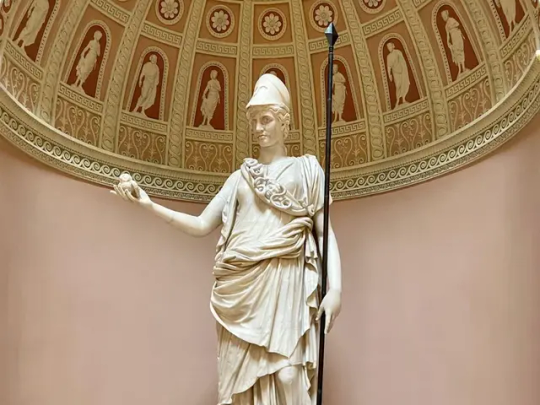
The Ancient Roman Statue of Athena Emerges After Nearly 300 Years in Hiding
After spending centuries on a British aristocrat’s estate in North Yorkshire, the marble masterpiece will be unveiled in Chicago’s Wrightwood 659 gallery later this weeks,
With an owl in the palm of her hand, a cloak adorned with a gorgon’s head and a warrior’s helmet upon her swept hair, Athena, as depicted in a Roman statue from the first century C.E., is a remarkable sight.
Now, for the first time in nearly 260 years, it will also be a widely accessible one.
This stunning marble depiction of the ancient Greek goddess of wisdom and warfare will go on public display in the atrium of the Wrightwood 659 gallery in Chicago’s Lincoln Park neighborhood starting on January 25.
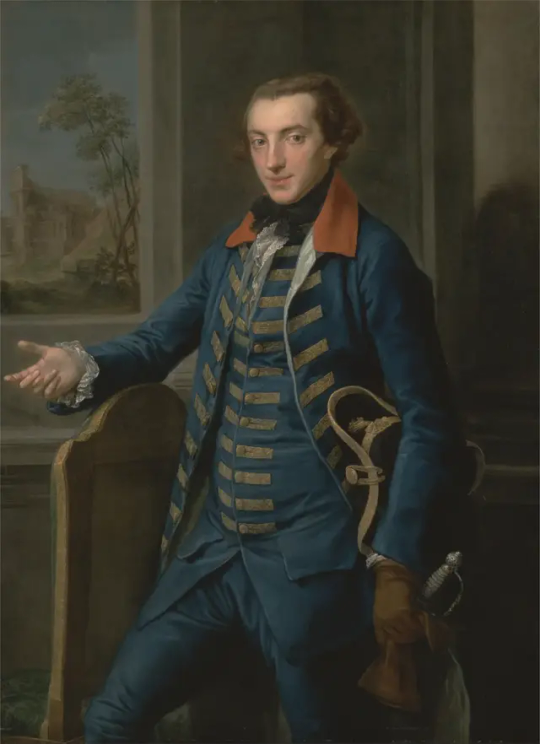
William Weddell, the British artistocrat who purchased the statue of Athena on a Grand Tour of Rome
Before the Halsted A&A Foundation acquired the sculpture in 2023, it was tucked away in a rose-colored niche in Newby Hall, the North Yorkshire country house of William Weddell, a British landowner and politician who traveled to Rome to purchase it in the mid-1700s.
“By displaying the sculpture at Wrightwood 659, the foundation invites the public to see a work which has been largely out of general public view for nearly three centuries,” Karen Manchester, the curator of the Halsted A&A Foundation, says in a statement.
“Now, scholars, students and visitors will be able to study the statue of Athena closely and interpret it from many perspectives, including those of art history, restoration practices and gender studies,” she adds.
Among the most interesting features of this Athena is the 74.5-inch-tall statue’s hodgepodge provenance. Its head came from a sculpture carved during the time of the Roman emperor Augustus (31 B.C.E. to 14 C.E.). Meanwhile, its body was grafted from a statue dating to the reign of Claudius (41 to 54 C.E.), the ruler who conquered Britain, according to the statement.
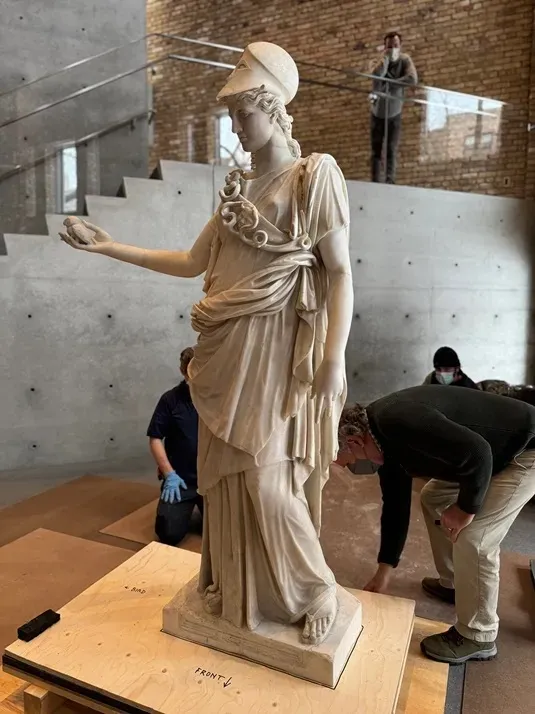
The so-called "Halsted Athena" at its new home at Wrightwood 659, a gallery in Chicago
But this mishmash of marble wasn’t a scam to get the wealthy Weddell to purchase a seemingly intact statue of Athena. “Rather, many buyers preferred complete pieces, even if composed of unrelated parts,” Manchester explains.
When older parts weren’t available, sculptors would carve new ones, such as the so-called Halsted Athena’s left arm and a section between her jaw and chest. While these “pastiches” might confuse archaeologists attempting to trace an artwork’s origins, Manchester says they tell complex stories about art, taste and aesthetics throughout history, per the Observer’s Elisa Carollo.
The Halsted Athena emerges from the confines of Weddell’s Newby Hall at the same time that 58 pieces from the Torlonia Collection, a trove of ancient sculptures, travel to North America for the first time. They will go on view at the Art Institute of Chicago’s “Myth & Marble” exhibition, which opens on March 15.
Weddell’s own journey to Rome to purchase the statue reflects the practice of Grand Tours across the cities of the ancient world, popular among young British aristocrats. A painter who encountered Weddell on his Grand Tour of Rome once remarked that the collector had “[bought] such a quantity of pictures, marbles, etc. as will astonish the West Riding of Yorkshire.”
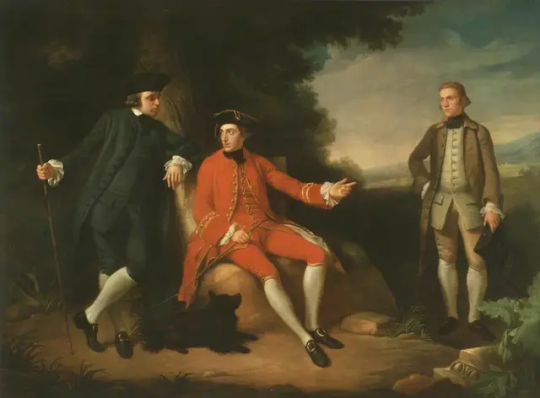
William Weddell and fellow British travelers as depicted by Nathaniel Dance-Holland, who remarked on the large number of antiquities that Weddell planned to bring home with him
Weddell and his fellow British travelers would have referred to the statue’s subject as Minerva, the Roman goddess, rather than Athena, “because they learned Latin in school, not ancient Greek, and therefore were familiar with the Latin names of deities,” Manchester tells Elena Goukassian of the Art Newspaper.
But the Roman statue distinctly depicts the Greek goddess, with her signature helmet and aegis, or sash-like cloak, draped across her chest.
“At the time these pieces were carved, the classical style was in vogue. In other words, ancient Roman customers wanted sculptures that reflected the look of ancient Greek and Hellenistic Greek,” Manchester adds.
Even in the first century C.E., when the statue took its complete form, Romans were harking back to an immemorial Greece. Now, the Halsted Athena’s voyage to the leafy avenues and art galleries of well-to-do Lincoln Park adds another chapter to its rich and complex backstory, stretching from Greece to Rome and from Yorkshire to Chicago.
By Eli Wizevich.
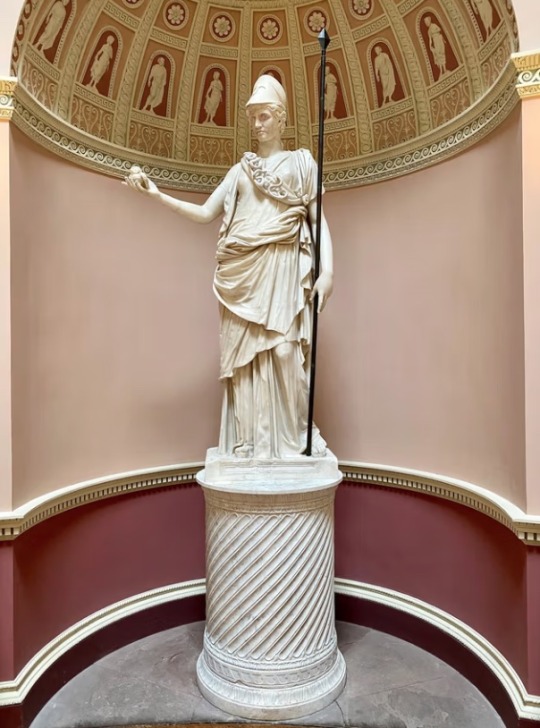
#The Ancient Roman Statue of Athena Emerges After Nearly 300 Years in Hiding#Wrightwood 659 gallery#William Weddell#Newby Hall#Halsted A&A Foundation#The Halsted Athena#marble#marble statue#marble sculpture#ancient artifacts#archeology#archeolgst#history#history news#ancient history#ancient culture#ancient civilizations#roman history#roman empire#roman art#ancient art
29 notes
·
View notes
Text
I was expecting something more thematic regarding Wyll's transformation, especially since there are obvious Beauty and the Beast parallels that are just ripe for the taking.
I genuinely expected this character, a heroic monster hunter so in love with fairy tales and romance, to strengthen the narrative surrounding the Tadfools and their fear of death, metamorphosis, or further transformation. For him to bring a completely new thematic resonance to the Emperor's story. For him to embody the city on the verge of discarding their soul to Gortash, the artistocrats, the vampires, and the (maybe futile?) attempt to save the city once again.
Instead, he is simply punished for his good act, and in a way that isn't close to his vow to kill Karlach on his "one good eye."
I really don't know what they were going for with all of that. *Warlock voice* And her contract doesn't make any fucking sense, as pointed out [here] (eta) and [here].
That's why I personally discard it, but I'm curious about what all of you amazing Wyll fans would have done if Larian gave a shit about him. What would you have done?
#bg3#baldur's gate 3#wyll ravengard#bg3 wyll#bg3 critical#larian critical#writing#he's such a beautiful character with such potential#oh I forgot the link lmao hang on#I think it was magpie who wrote about it (they are fantastic - I've reblogged a lot from them - ETA ADDED!)#if anyone knows the meta I'm talking about while I'm at work#I'm adding a reddit discussion as placeholder for the moment (hellish even for me I know)#but these contracts are at least as binding and specific as any other so it literally bugs me that she's able to do as she pleases#imagine if his warlock contract was just as hypocritical as Ulder's diplomacy#until it's Ansur and the choice between him and the Emperor#ahhh#I get why this redditor in particular accepted that answer and it may be acceptable for an Archfey or Great Old One#but Devil/Fiends? The embodiment of LAWYERS FOR THE RICH AND POWERFUL?#spare me. there are technical outs#but no.
37 notes
·
View notes
Note
https://www.tumblr.com/cuntylouis/770148252145369088?source=share
I love this post, I once saw someone on here argue Louis was a stereotypical Byronic hero whereas Lestat had more feminine, softer traits in their relationship (which yes he has them too but he was incredibly patriarchal too) and I remember thinking but I can see all the black female inspirations Jacob has used for Louis and that to me there were so many aspects to Louis that were the opposite of just broody and troubled and only soft inside. I felt like the blog making the posts had an idea of what made up white femininity and couldn't see past that. But I couldn't properly explain it but this really sums it up.
Yeah, i think with people who view Lestat as feminine/femme/mother/soft while not being able to see those qualities in Louis it often comes down to seeing blackness as inherently more masculine and whiteness as inherently more feminine (even if subconsciously), and looking at the characters from their specific (modern white) cultural point of view. Like the post you linked says Louis is noticeably gnc/feminine to black audiences, and to other characters in the story in that time period, and he's clearly intentionally written and played like that. It's not a coincidence that the celebrities Jacob took inspiration from are black women + plus Bowie who was famously androgynous. Meanwhile Lestat would likely not be perceived as feminine or gnc in the story by other characters or by himself, everything in his appearance and demeanor would be considered typical of European artistocratic men at the time. When people headcanon Lestat as feminine/femme it unfortunately often comes together with trying to make Louis more masculine and aggressive and erase the strong patriarchal element of Lestat's abuse towards Louis and Claudia
26 notes
·
View notes